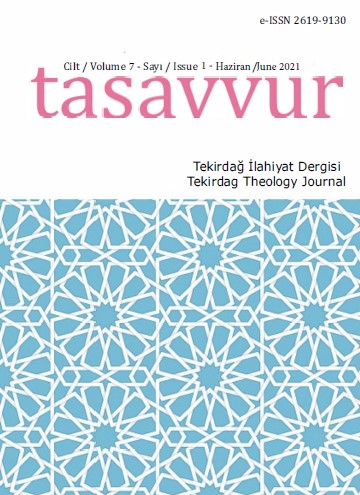Mütekaddim Dönem Sünnî Kelâmında Keramet
Karāma in Early Period Sunnī Kālam
Author(s): Hasan Sefa TuranSubject(s): Islam studies, 6th to 12th Centuries, History of Islam
Published by: Tekirdağ Namık Kemal Üniversitesi İlahiyat Fakültesi
Keywords: Kalām; Prophethood; Miracle; Karāma; Walī; Extraordinary;
Summary/Abstract: The main evidence used in a matter of proving prophethood in Kalām is miracles. For this reason, other extraordinary situations that miraculously occur have always been on the agenda of theologians. Of these the most similar to miracle is karāma events that occur extraordinary in the hands of Walī. Karāma has been discussed on certain theoretical grounds in kalām books during the beginning period of Sunnī kalām. As in other theological debates, the leading adversaries of Sunnī theologians in the issue of karāma were Muʿtazilite theologians. This study discusses approaches towards karāma in early period of Sunnī kalām. Accordingly, the scholars who determined the basic approaches of Ashʿariyya and Māturīdiyya kalām schools are included in the study. İmām al-Ashʿarī (d. 324/935), Ibn Fūrak (d. 406/1015), al-Bāqillānī (d. 403/1013), ʿAbd al-Qāhir al-Baghdādī (d. 429/1037), Abu’l-Maʿālī İmām al-ḥaramayn al-Juwaynī (d. 478/1085), Abū ʿAbdallāh al-Ḥalīmī (d. 403/1012) and Abū Isḥāq al-Isfarāyīnī (d. 418/1027) from Ashʿarī school; Abū Manṣūr al-Māturīdī (d. 333/944), Ḥakīm as-Samarqandī (d. 342/953), Abū al-Yusr al-Bazdawī (d. 493/1100) and Abū al-Muīn an-Nasafī (d. 508/1115) from Māturīdiyya school, in this context, are included in the study. Besides, some authors from fields other than kalām are included in the scope of the study in order to determine the first use of the concept of karāma and different approaches are discussed. In the study, after the views of the theologians on the subject are presented descriptively, these views are critically assessed.
Journal: Tasavvur Tekirdağ İlahiyat Dergisi
- Issue Year: 7/2021
- Issue No: 1
- Page Range: 63-94
- Page Count: 32
- Language: Turkish

